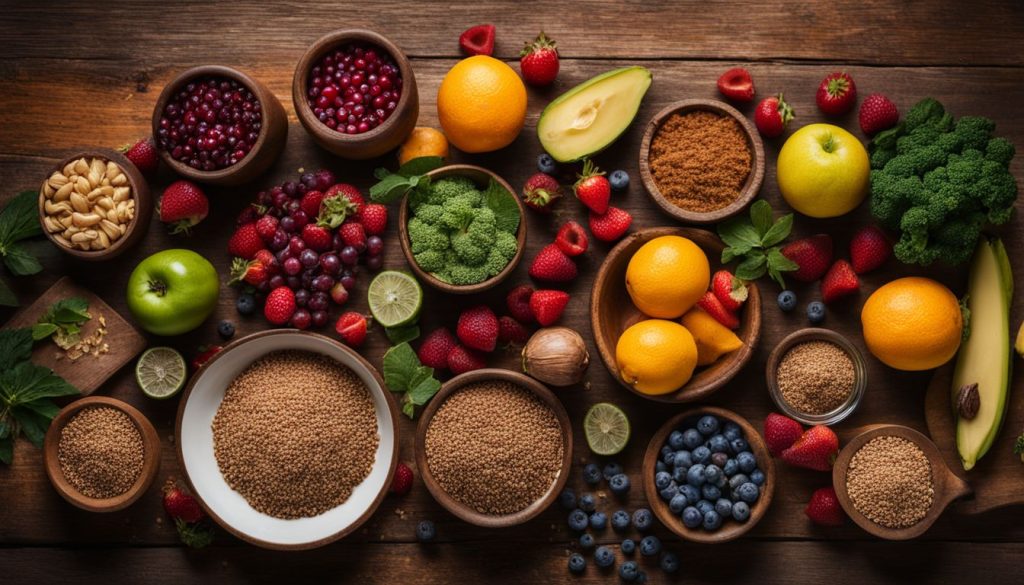Blog
Superfoods You Should Add to Your Diet Today
In the world of nutrition, the term “superfoods” has become a buzzword. These nutrient-dense foods are packed with vitamins, minerals, and antioxidants that can have a positive impact on your health. While there’s no official definition for what constitutes a superfood, the general consensus is that these foods provide exceptional health benefits when included in a balanced diet. From boosting immunity to enhancing energy levels, superfoods are a great addition to any diet. In this article, we’ll explore the top superfoods you should add to your meals today to support your overall health and wellness.
1. Blueberries: Antioxidant Powerhouses
Blueberries are often hailed as one of the most powerful superfoods due to their high antioxidant content. These small, vibrant berries are packed with anthocyanins, which are compounds known for their anti-inflammatory and antioxidant properties. These antioxidants help fight oxidative stress, which can contribute to aging and chronic diseases.
Health Benefits:
- Rich in antioxidants: Blueberries are loaded with antioxidants that help neutralize free radicals in the body.
- Improved brain function: Studies suggest that regular consumption of blueberries may help improve memory and cognitive function.
- Support heart health: Blueberries may help lower blood pressure and reduce the risk of heart disease.
How to Add Them to Your Diet:
- Add fresh or frozen blueberries to smoothies, oatmeal, or yogurt.
- Enjoy them as a snack or toss them into salads for a burst of sweetness.

2. Kale: The Nutrient-Dense Leafy Green
Kale is a nutritional powerhouse and one of the most popular leafy greens in the health food world. It’s rich in vitamins A, C, and K, as well as fiber, iron, and calcium. The high antioxidant content in kale also makes it a great food for fighting inflammation and promoting overall health.
Health Benefits:
- Rich in vitamins and minerals: Kale provides an excellent source of vitamin K, which is essential for bone health and blood clotting.
- Anti-inflammatory properties: The antioxidants in kale, including flavonoids and carotenoids, help reduce inflammation in the body.
- Supports digestive health: Kale’s fiber content promotes healthy digestion and can aid in regular bowel movements.
How to Add It to Your Diet:
- Add kale to salads, soups, or smoothies for a nutrient boost.
- Make crispy kale chips by roasting it in the oven with olive oil and sea salt.
3. Avocados: The Healthy Fats You Need
Avocados have become a staple in many diets thanks to their creamy texture, versatility, and nutritional benefits. They are high in healthy monounsaturated fats, which are essential for heart health. Avocados also provide a wealth of vitamins, minerals, and fiber, making them a great choice for overall health.
Health Benefits:
- Heart health: The healthy fats in avocados can help lower bad cholesterol (LDL) while boosting good cholesterol (HDL).
- Rich in potassium: Avocados are a great source of potassium, which is important for regulating blood pressure.
- Promotes digestion: The fiber in avocados supports healthy digestion and can help prevent constipation.
How to Add It to Your Diet:
- Spread avocado on toast or blend it into smoothies.
- Add it to salads, or use it as a topping for tacos, burritos, or sandwiches.
4. Chia Seeds: Tiny but Mighty
Chia seeds are tiny powerhouses of nutrition. These small, black-and-white seeds are rich in omega-3 fatty acids, fiber, protein, and various micronutrients. Despite their small size, chia seeds pack a big nutritional punch and are great for promoting digestive health and reducing inflammation.
Health Benefits:
- High in fiber: Chia seeds are loaded with fiber, which helps support healthy digestion and keep you feeling full longer.
- Omega-3 fatty acids: These healthy fats are important for heart and brain health.
- Blood sugar control: The fiber and protein in chia seeds can help stabilize blood sugar levels.
How to Add Them to Your Diet:
- Sprinkle chia seeds on yogurt, oatmeal, or smoothies.
- Make chia pudding by soaking them in almond milk or coconut milk overnight.
5. Salmon: A Rich Source of Omega-3 Fatty Acids
Salmon is widely recognized for its high omega-3 fatty acid content, which is vital for brain function and heart health. Omega-3s help reduce inflammation, improve cognitive function, and lower the risk of chronic diseases. Salmon is also an excellent source of high-quality protein, which is essential for muscle building and overall wellness.
Health Benefits:
- Heart health: The omega-3s in salmon help lower blood pressure and reduce the risk of heart disease.
- Improved brain function: Omega-3 fatty acids are important for brain health, and regular consumption of salmon may help improve memory and cognitive function.
- Boosts skin health: The healthy fats in salmon contribute to glowing, hydrated skin.
How to Add It to Your Diet:
- Grill, bake, or pan-sear salmon for a delicious and healthy dinner.
- Add smoked salmon to salads, sandwiches, or bagels for a quick and nutritious meal.
6. Sweet Potatoes: A Nutrient-Rich Root Vegetable
Sweet potatoes are a versatile and nutrient-rich root vegetable that provide an array of vitamins, minerals, and antioxidants. They are an excellent source of beta-carotene, which the body converts into vitamin A, a crucial nutrient for eye health and immune function. Sweet potatoes are also rich in fiber, which helps support digestive health.
Health Benefits:
- Rich in beta-carotene: This antioxidant supports healthy vision and immune function.
- Supports digestive health: The fiber in sweet potatoes helps maintain a healthy digestive system.
- Regulates blood sugar: Sweet potatoes have a low glycemic index, which helps regulate blood sugar levels.
How to Add Them to Your Diet:
- Roast sweet potatoes as a side dish or mash them for a comforting meal.
- Incorporate sweet potatoes into soups, stews, or salads for added flavor and nutrition.
7. Quinoa: The Complete Protein
Quinoa is often referred to as a “supergrain,” and for good reason. It is a complete protein, meaning it contains all nine essential amino acids that the body cannot produce on its own. This makes quinoa a great plant-based protein source for vegetarians and vegans. Additionally, quinoa is high in fiber, antioxidants, and various vitamins and minerals.
Health Benefits:
- Complete protein: Quinoa provides all the essential amino acids, making it a great protein source for plant-based diets.
- Rich in antioxidants: Quinoa is packed with antioxidants that help reduce inflammation and fight free radicals.
- Supports weight management: The high fiber content in quinoa helps keep you full and satisfied.
How to Add It to Your Diet:
- Use quinoa as a base for salads, grain bowls, or stir-fries.
- Substitute quinoa for rice in your favorite dishes to boost the nutritional value.
8. Turmeric: The Anti-Inflammatory Spice
Turmeric is a powerful spice that has been used for centuries in traditional medicine. Its active compound, curcumin, is known for its potent anti-inflammatory and antioxidant properties. Turmeric has been studied for its potential to improve joint health, reduce inflammation, and protect against chronic diseases.
Health Benefits:
- Anti-inflammatory: Curcumin in turmeric helps reduce inflammation in the body, which can benefit conditions like arthritis.
- Improves brain function: Studies suggest that turmeric may help improve memory and protect against cognitive decline.
- Supports heart health: Turmeric may help reduce cholesterol levels and improve circulation.
How to Add It to Your Diet:
- Add turmeric to soups, curries, or smoothies for a burst of flavor and health benefits.
- Make golden milk by mixing turmeric with warm milk or plant-based alternatives for a soothing drink.
Conclusion
Incorporating superfoods into your diet is an easy and effective way to boost your overall health and wellness. From antioxidant-rich blueberries to heart-healthy salmon, these nutrient-dense foods provide a variety of benefits that can improve everything from your immune system to your energy levels. Whether you add them to smoothies, salads, or main dishes, these superfoods are versatile and delicious ways to fuel your body with the nutrients it needs. Start incorporating these superfoods into your meals today and experience the positive impact they can have on your health.



